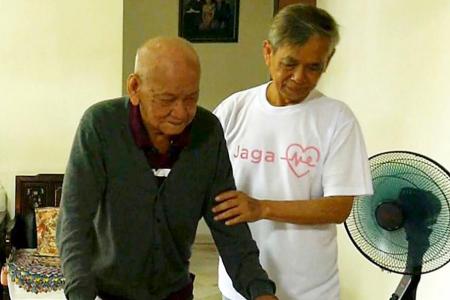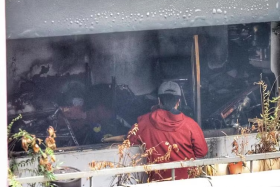Market for elderly on-demand home care thriving
Growing market for services like respite care and nursing at home
When her father became bedridden after a stroke last year, Ms Fareena Abdul Rahim knew he needed to be cared for professionally at home.
When he was discharged from hospital, she hired a trained nurse from Jaga-Me for two weeks to help her mother and maid.
The senior engineer, 30, who learnt about the local healthcare tech outfit through Facebook, told The New Paper: "Ithas been able to provide nurses according to our criteria, like whether we want a male nurse or a Malay speaker."
Ms Fareena is not alone - more people are looking to start-ups such as Jaga-Me to meet home-care needs for the elderly.
This has created a thriving marketplace for home-care services on demand - something Minister of State for Health Chee Hong Tat had encouraged.
He told Parliament last month: "Not all the ideas will succeed, we must expect some to fail. The key is to have an environment where we can try new ideas and fail safely, so that we can learn from these failures and continue to innovate by pushing the boundaries."
A quick check showed at least six start-ups offering a range of pay-per-use home-care services.
Homage and Jaga-Me, for example, offer respite care and home nursing.
eBeeCare, which has a mobile app, caters not just to seniors, but also to new mothers and those who need physiotherapy or other rehabilitation services.
An hour of respite care can cost between $20 and $25.
These start-ups are like the Uber of the healthcare sector - request any service listed on their websites and you will be matched with a suitable, trained professional.
Demand is growing at Jaga-Me, with a 15 to 20 per cent increase every month since late last year, said co-founder Julian Koo.
This is driven by growing awareness among the public and in hospitals.
He told TNP: "Now, because of our quality of service and track record, public hospitals are referring clients to us."
INCREASING DEMAND
At eBeeCare, the demand increases at least 10 per cent a month, said co-founder John Chen.
Similarly, Homage co-founder Gillian Tee said she has seen strong growth for services since its launch last year.
She said: "We think the need from the community is broad and deep enough for us to be complementary and mutually supportive."
To meet manpower needs, the start-ups use a pool of some 5,000 licensed but inactive nurses here.
Mr Koo said: "This allows nurses to remain in their profession and continue to contribute in the healthcare system while having flexibility."
The hours can be quite demanding for nurses, many of whom want to spend time with their families, he added.
At home-care start-ups, freelance nurses take on cases to suit their own schedules.
Freelance nurse Nur Fatin Omar, 24, who has two toddlers, quit her full-time job after she became pregnant with her first child.
Now with Homage, she can practise as a nurse while caring for her family.
She said: "I just need to tell them which days I am available, and they will see which cases I can attend to."
But running a marketplace for senior- and home-care services for the long-term will be challenging, said Mr Chen.
There is the issue of quality and working with insurance companies or voluntary welfare organisations on a claiming process, he added.
Nominated MP K. Thanaletchimi said such services must remain affordable.
The head of the Healthcare Services Employees' Union told TNP: "What we need to ask is: When demand goes up, what is the subsidy? How do you extend it? I am sure the Ministry of Health (will) make sure that such care is accessible."
Get The New Paper on your phone with the free TNP app. Download from the Apple App Store or Google Play Store now



